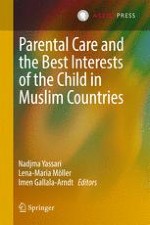2017 | OriginalPaper | Buchkapitel
12. Synopsis
verfasst von : Nadjma Yassari, Lena-Maria Möller, Imen Gallala-Arndt
Erschienen in: Parental Care and the Best Interests of the Child in Muslim Countries
Verlag: T.M.C. Asser Press
Aktivieren Sie unsere intelligente Suche, um passende Fachinhalte oder Patente zu finden.
Wählen Sie Textabschnitte aus um mit Künstlicher Intelligenz passenden Patente zu finden. powered by
Markieren Sie Textabschnitte, um KI-gestützt weitere passende Inhalte zu finden. powered by
